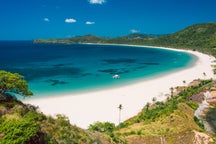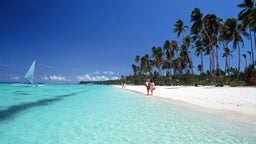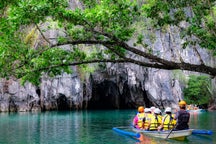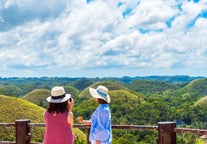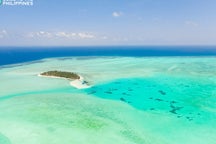
A morning brew to wake up the senses and jumpstart the day, a cold cup on a lazy afternoon by the beach, or a hot perk while gazing at stunning landscapes up in the highlands. Coffee has become an inevitable part of one’s day, especially when traveling.
If you're traveling in the Philippines, quality coffee is something to look out for. While the country may not be synonymous yet with a rich coffee culture like that of Vietnam, Colombia, or Italy, the Philippines has grown and cultivated an array of coffee varieties since the 18th century.
- Browse Philippine food and culinary tours to add to your itinerary
Artisanal cafes and third-wave coffee shops have also sprouted in the Philippines over recent years.
Thanks to a new breed of entrepreneurs honoring locally sourced beans and the communities that have worked hard for generations, Filipino coffee is finally in the spotlight.
Read on and sip into the best of Philippine coffee with this guide:
Origins of Coffee in the Philippines
With varied topography and rich soil conditions, the Philippines is one of the few countries in the world that produces four varieties of coffee: Robusta, Arabica, Excelsa, and Liberica. Regional microclimates around the country also influence the varieties that are grown in specific areas.
Here are some Philippine destinations that grow the best coffee beans and are must-adds to your travel itinerary if you're a coffee lover:
Batangas

The rich history of the Philippines ’ coffee culture dates back to 1740 when a Spanish Franciscan monk introduced the first coffee tree in the town of Lipa, Batangas. The place has since been regarded as the “coffee capital of the Philippines.”
It is mostly noted for growing the rare Coffea liberica, which is popularly known in the country as Kapeng Barako. The latter term means “strong man or manliness” as this coffee variety features a strong taste and sharp aroma.
While Kapeng Barako is associated with the older generations, a new wave of coffee enthusiasts and coffee shop owners is bringing back its glorious days.
Benguet
If you're dreaming of a laidback trip where you're sipping on a hot brew in chilly mountains, a trip to Benguet is perfect for you. Situated in the majestic highlands of the Cordillera Mountain Range in North Luzon, Benguet’s upland climate and rich soils produce top-class Arabica coffee in the entire country.
- Read our article on the top tourist spots in Baguio
The locals farm organically and without the use of any pesticides — producing coffee with characteristics of apricot, lemongrass, and pomelo that once earned the best Arabica coffee title in a national coffee conference.
Sagada
Another Cordilleran town is emerging as the Arabica capital of the Philippines. Sagada may be famous for its stunning caves and hanging coffins, but coffee grown here is also highly celebrated by coffee-lovers in the country.
Characterized by its bittersweet taste and nutty notes, Sagada’s coffee and its success is tied with the local farmers’ culture and municipal laws here: performing rituals such as planting only prior to the full moon, and requiring every household to plant coffee trees.
Kalinga
Filipino and international travelers troop up to the uplands of Kalinga, still in the Cordilleras, for one main reason: getting inked by Apo Whang-Od, the oldest mambabatok (Kalinga traditional tattoo artist) in the country. But there’s also one thing that Kalinga has tattooed in the minds of anyone who has been there: their coffee.
Popularly known as Kalinga Brew, it is purely made of Robusta beans. In the village of Buscalan where Apo Whang-Od lives, the locals swear by only one proper way of preparing their coffee: “cooking” the grounds in boiling water with brown sugar.
Sulu Archipelago
All the way down south of the Philippines is the Sulu Archipelago, with rich and fertile land that has become home to Sulu robusta coffee plantations. This homegrown signature coffee is known as Kahawa Sug by the Tausug peoples, which means “coffee of Sulu”, and is neither too bitter nor acidic.
It is an integral part of the Tausug way of life, usually as an accompaniment to bangbang (snacks) or latil (native dishes). It is also traditionally served with an extra empty cup, so the hot coffee can be poured back and forth — both to cool it down and boost its flavor.
Sultan Kudarat
A surprise to many, the Mindanao region is actually producing 70% of the Philippines’ annual coffee output. Aside from Sulu, another superstar in coffee production is the province of Sultan Kudarat.
In fact, it is becoming the next coffee capital of the country and grows export-quality beans of both the Arabica and Robusta varieties.
Cotabato

The elevated terrains of Cotabato province make it ideal for growing top-quality coffee, particularly Arabica beans. Cotabato’s coffee production saw its peak during the 1960s to the 80s.
At present, several social enterprises, such as Coffee for Peace, are reviving the province’s bountiful production. Mt. Matutum in South Cotabato is famous for its civet coffee, with the civet cats roaming free in its lush wilderness and feeding on ripe coffee cherries.
Bukidnon
Locally, Bukidnon is synonymous with expansive pineapple plantations. But the pulpy fruit isn’t the only crowning glory of this Northern Mindanao province. Cruising along the long roads of Bukidnon, one can only be amazed by its endless rolling hills and majestic mountains — stunning highlands that are also cultivation grounds of high-quality coffee.
- Book a Dahilayan Forest Park package with Del Monte pineapple plantation tour
- Enjoy a Bukidnon flower farm & cafe tour
- See other Bukidnon tours
In fact, both specific Arabica and Robusta coffees are grown here have won the country’s first “green coffee quality” competition. Benedictine monks in a popular monastery here also produce coffee known as “Monks’ Blend.”
Davao
The Davao region has earned its name of being the “Fruit Basket of the Philippines”, thanks to its fertile lands and favorable climate. Coffee grown here in Davao is also of high quality, with varieties that produce different taste profiles ranging from nutty, chocolatey, to berry-like.
Specialty coffee growers here are flourishing, as Davao millennials show a keen interest in homegrown specialty coffee. In fact, when you find yourself traveling to Davao, you will be spoiled by the wide selection of third-wave coffee shops that offer Mindanao specialty coffee.
Cavite
 Photo by Cafe Amadeo Coffee
Photo by Cafe Amadeo Coffee
Cavite, like its neighboring Batangas, is a province closely associated with coffee. The town of Amadeo, Cavite was also once regarded as the coffee capital of the Philippines, particularly for its production of the Robusta variety.
They also grow the other varieties, and their combination of the beans makes for what is locally known as the Pahimis Blend. Pahimis Festival is also celebrated in Cavite, a thanksgiving celebration for the bountiful harvest of coffee beans.
If you're in Cavite, visit the nearby cafes in Tagaytay during your trip.
Ilocos
Fancy a hot brew while in a well-preserved Spanish colonial city? Or a coffee session after surfing? You can do these in the region of Ilocos, known for its historical sites, gorgeous beaches — and coffee.
Expect high quality: a Robusta variety grown here has won first place in the 3rd Philippine Coffee Quality Competition.
Iloilo
There is no shortage of specialty cafes in the province of Iloilo. The province’s remote forests and mountains produce great quality coffee beans, which supply these homegrown coffee shops. The indigenous Ati tribe communities in Iloilo have also become some of the province’s top producers.
Local Coffee Shops and Brands
While large, international coffee brands and chains have sprouted in many parts of the Philippines, there are a handful of local coffee shops like Tagaytay cafes and coffee shops in Antipolo that you should visit during your Philippine food tours.
- Check out our article on Instagrammable cafes in Manila
A hopeful breed of Filipino coffee enthusiasts and young entrepreneurs have boldly and happily put up quaint coffee shops, small roasteries, and humble cafes that celebrate Filipino coffee and reinvigorate the local industry.
Smell the aroma and taste the best brews in these local coffee shops and must-try brands in the Philippines:
Commune (Makati)
 Photo by Commune
Photo by Commune
Situated in the now-hip Poblacion neighborhood in Makati City, Commune Cafe is dedicated to serving only 100% Philippine coffee.
- Check out the top tourist spots in Makati City
Sourced directly from farmers in Benguet, Sagada, South Cotabato, Kapatagan, and Bukidnon, Commune’s freshly-brewed coffee can be enjoyed with their light bites in a homey yet contemporary setting. Their signature Commune Blend is a mix of Arabica beans and a bit of Robusta.
Cafe de Lipa (Batangas)
 Photo by Cafe de Lipa
Photo by Cafe de Lipa
Reviving the illustrious days of Kapeng Barako (liberica) is Cafe de Lipa in Batangas, the birthplace of coffee in the Philippines. The owners trace their lineage to two members of their family who helped propagate the first coffee trees.
- Check out tours in Batangas for your itinerary
Expect nothing but authentic and high-quality coffee here, especially their signature class brew Barako Joe. Cafe de Lipa also sources beans from other parts of the country, including Robusta from Cavite, Ilocos, and Basilan, as well as Arabica from Benguet, Bukidnon, and Cotabato.
El Union Café (La Union)
 Photo by El Union Coffee
Photo by El Union Coffee
Coffee can be practically consumed anywhere, anytime (it’s the second most consumed beverage in the world after all). But there is something magical about the smell of coffee aroma and sea breeze together. Head to the El Union Café in the surf town of La Union, for a caffeine fix right by the beach.
Sourced from farmers in the Cordilleras, Benguet, Davao, and Bukidnon, El Union’s coffee is a hit to city dwellers, especially their signature Dirty Horchata, made of farm-fresh milk with a shot of espresso.
Balsa Kafe & Agri-tourism Hub (Leyte)
 Photo by Balsa Kafe
Photo by Balsa Kafe
Nestled in the middle of vast rice fields in Southern Leyte, Balsa Kafe & Agri-tourism Hub is becoming one of the town’s must-visit destinations for its sweeping views, serene atmosphere, and great coffee.
- Find the best Leyte trips and activities
- Book a Kalanggaman island tour from Cebu
The cafe and hub work directly with local farmers and farming communities around the area, sourcing their fresh produce and local coffee beans from them.
Bo's Coffee
 Photo by Bo's Coffee
Photo by Bo's Coffee
With over 100 branches nationwide, Bo’s Coffee is definitely one of the most successful Filipino-owned coffee chains.
Priding themselves with their homegrown identity, Bo’s Coffee puts the spotlight on Philippine coffee, sourcing their beans from the highlands of Sagada and Benguet, as well as from the lush Mindanao mountains namely Mt. Kitanglad, Mt. Apo, and Mt. Matutum.
So on your next visit in the Philippines (or even Qatar – they opened their first overseas store there!), make sure to taste the best of Philippine coffee at Bo’s.
Coffee Break Vigan (Vigan)
 Photo by Coffee Break Vigan
Photo by Coffee Break Vigan
Imagine cobblestone streets and Spanish colonial buildings that instantly take you back in time, this is what awaits you at the UNESCO World Heritage City of Vigan in Ilocos Sur.
- Browse the best tours in Vigan that you should add to your itinerary
And true to its name, Coffee Break Vigan is an ideal place to sit down, relax, and sip coffee sourced from the mountains of Ilocos Sur in between sight-seeing and strolling in this historical town.
Madge Cafe (Iloilo)
Madge Cafe is considered an Iloilo icon and has become a staple breakfast stop for travelers exploring the tourist spots of Iloilo. It has been serving coffee since 1951, and using its original pre-war concoction. They also source their coffee beans from the northern parts of Iloilo and the neighboring province of Guimaras.
Expect no fancy coffee machines here either: Madge Cafe still traditionally prepares their coffee using a culador (flannel sieve), holding and boosting the flavor as layers of beans are added.
- Find the best trips and activities in Iloilo
Pair their hot or cold brews with signature delicacies like puto (steamed rice cakes) or ibus (glutinous rice and coconut milk). Legacy has never tasted this delicious.
Palazzo Coffee Shop (Ifugao)
 Photo by Palazzo Coffee Shop
Photo by Palazzo Coffee Shop
Home to the Banaue Rice Terraces, considered as the “Eighth Wonder of the World” and a UNESCO World Heritage Site, Ifugao produces not only high-quality rice but also coffee.
In these lush highlands, locals still employ traditional and organic ways of farming rooted in old rituals to the gods. Palazzo Coffee Shop, highly rated in many travel review sites, uses coffee beans that are grown in the area, mostly the Robusta type and some Arabica beans.
Cafe Amadeo (Cavite)
 Photo by Cafe Amadeo Coffee
Photo by Cafe Amadeo Coffee
With the hopes of reviving the golden days of Cavite’s coffee industry, Cafe Amadeo is putting their local beans at the forefront. The shop is run by Cafe Amadeo Development Cooperative, a group of farmers and individuals dedicated to continuing the rich history of Amadeo’s coffee culture.
- Browse the best tours in Cavite
The cafe is popular for its Pahimis Blend, a definitive combination of Robusta, Arabica, Excelsa, and Liberica beans which are all grown in this town.
Datu’s Brew (Cotabato)
A coffee shop that advocates for history, art, and peace in Mindanao, Datu’s Brew is the first Bangsamoro-conceptualized fair trade coffee shop in the Philippines.
Artistic items and fine handicrafts of Maguindanao are displayed in the cafe, but their locally-sourced 100% Arabica beans, which have been ranked as Premium Coffee in global cupping standards, take center stage.
Bukidnon Brew Cafe (Bukidnon)
 Photo by Bukidnon Brew Cafe
Photo by Bukidnon Brew Cafe
Don’t let this family-owned cafe’s unembellished store facade stop you from going inside, Bukidnon Brew Cafe (BBC) is one of Bukidnon’s favorite coffee shops and hangout places.
Located right at the heart of Malaybalay City, BBC prides itself in brewing and serving the traditional Monk’s Blend coffee, beans grown and produced by Benedictine Monks in the area.
Blugré Coffee (Davao)
 Photo by Blugré Coffee
Photo by Blugré Coffee
Davao is synonymous with Durian, dubbed as the “king of fruits.” And that’s exactly what awaits visitors to Blugré Coffee.
Its iconic Durian Coffeecino, a signature concoction of the fruit and locally-sourced pure Arabica coffee, has made it a household name in Davao and other parts of the country where it has expanded.
- Check out other tourist spots in Davao that you should visit
Talks of opening Blugré stores in other countries are happening as well, with the shop’s slogan to “bring Davao to the world.”
Coffee Culture Roastery (Negros)
 Photo by Coffee Culture Roastery
Photo by Coffee Culture Roastery
Bacolod, the country’s City of Smiles, is undoubtedly a food-lover’s paradise. Aside from its iconic chicken inasal restaurants that are always included in Bacolod tours, the province's cafe culture is also on the rise.
Coffee Culture Roastery is the town’s very first artisan coffee roaster, sourcing most of their beans from local Philippine farmers.
Their “Negros Blend” uses a mix of Robusta and Arabica beans from Negros Island’s Mt. Kanlaon, with hints of dark chocolate and roasted nuts.
Filibeans (Siargao)
 Photo by Fili Beans Espresso
Photo by Fili Beans Espresso
Situated inside the tranquil grounds of Harana Surf Resort, Filibeans is one of Siargao’s well-loved coffee shops. And true to its name, Filibeans celebrates Philippine coffee and sources directly from local suppliers.
- Look for the best Siargao tours that you can add to your itinerary
It’s the perfect place to chill out after riding out Siargao’s world-class waves, having a glass or two of their signature “Espresso Martini” — dark and nutty coffee with a kick of alcohol.
Cardinal Coffea (Cebu)
To complement their famous pastries such as cheese bread and special ensaymada (sweet dough pastry with butter, sugar, and cheese), Cardinal Bakeshop in Cebu opened its own coffee shop.
- Check out trips and activities in Cebu
Cardinal Coffea serves a wide range of coffee products from hot drinks, espresso blends, and iced variants, so make sure to get a quick caffeine and pastry fix here when you find yourself in Cebu City!
Henry & Sons (Mandaluyong)
With a long and proud legacy of sustainable coffee production in the country, Henry & Sons pays tribute to the hardworking coffee farming communities of La Trinidad, Benguet with their wide range of premium coffee blends.
Their Sustainable.PH Blend marries the complex flavors of three single-origin coffees. Proceeds from their Bloom Coffee line, which can be enjoyed at The Giving Cafe located in Mandaluyong City, Manila, directly support fundraising efforts for Benguet coffee farmers.
Bana’s Coffee (Sagada)
Located in the rich highlands of Sagada, Bana’s Coffee is famous for both its Arabica house blend and Kape Alamid, coffee made from droppings of civet cats. From their cafe’s balcony, one can enjoy world-class coffee while looking out on sweeping gorge views.
We say this with confidence because Bana’s Coffee won the Medaille Gourmet in the “International Contest of Coffees Roasted in their Countries of Origin” in 2017, awarded in Paris, France.
Join a Coffee Farm Tour
If you want to learn more about the different types of coffee in the Philippines and how they are made, the coffee farm tour in Amadeo, Cavite (which is near Tagaytay City) is perfect for you.
This three-hour coffee farm tour begins at ECHOfarms. You’ll enjoy welcome coffee and participate in Coffee 101, a quick introductory session that allows you to taste different coffee varieties grown on the farm as an expert tells you all about them.
You will then head to the Philippine Coffee Board Inc. Technology Center, where you will learn more about the life cycle of a coffee plant. You’ll tour the germination area, the nursery beds, and the planting and harvesting areas before enjoying fresh coconut juice at The Pavilion.
If your tour falls during harvest season, you will experience soaking and drying the harvested beans yourself. Afterward, you’ll go back to ECHOfarms so you can visit the milling and sorting areas and then enjoy a live demonstration of coffee brewing. Sample the available coffee varieties before shopping at ECHOstore.
Discover the World of Philippine Coffee

Idyllic islands, pristine beaches, magnificent rice terraces, and volcanic highlands — these are the crowning jewels of the Philippines. But the country’s fertile soils also produce a world-class harvest, from tropical fruits to rice, to its own black gold: coffee.
With the growing number of artisanal coffee shops, specialty coffee growers, and homegrown cafes, it’s safe to say that the Philippines’ local coffee industry is not just waking and warming up, it is well alive and kicking — for all the world to sip, taste, and celebrate.
Start planning your coffee exploration trip by checking out tours in the Philippines that you can add to your itinerary.





